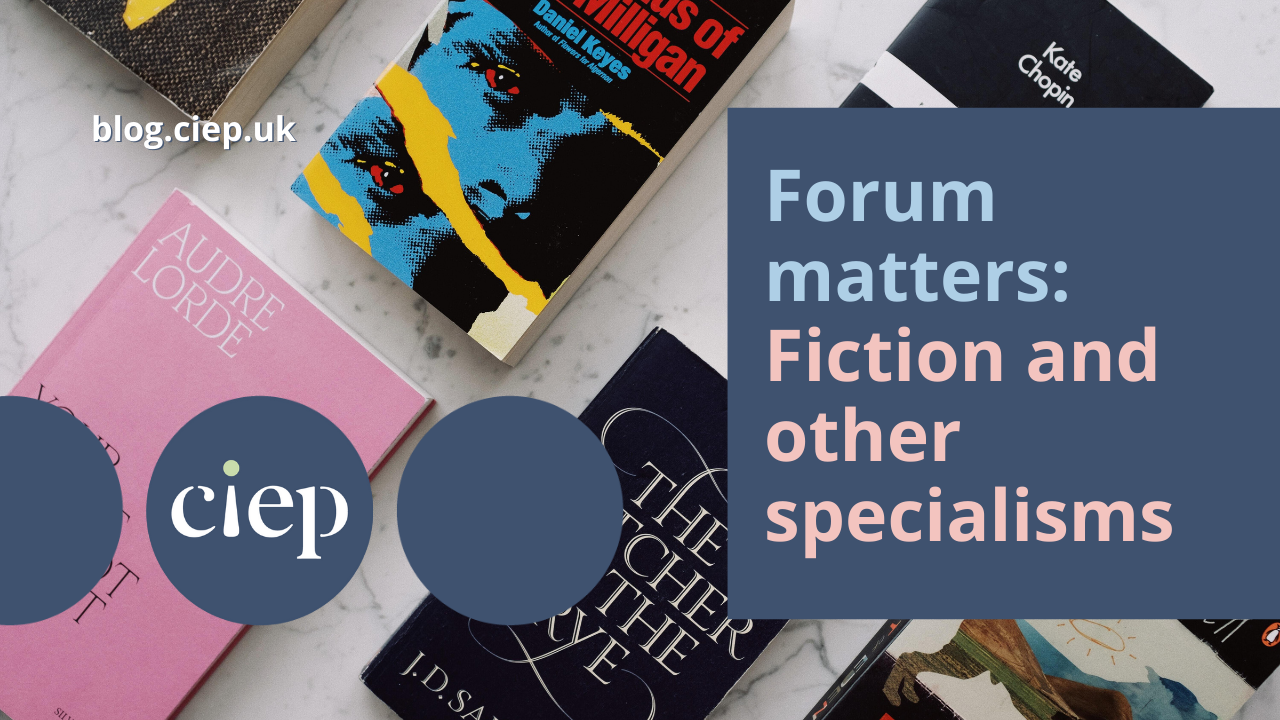This feature comes from the band of CIEP members who volunteer as forum moderators. You will only be able to access links to the posts if you’re a forum user and logged in. Find out how to register.
Supporting members’ specialisms
One of the best things about the CIEP community is the sheer breadth of knowledge held and shared freely by its members. From FRedit to flamingos, there’s bound to be a tasty morsel that will make your life easier, or at least a little more interesting, especially if you dig a little deeper into the specialist groups, which were created to avoid overwhelming the core forums. Find out more about joining one or more of these forums.
Since this issue of The Edit is all about fiction, it’s an opportunity to draw your attention to the Fiction forum, which has over 500 members. Of course, fiction editors will gain a lot from the main forums in the first place, and recent useful threads have covered checking facts, how deep down the rabbit hole you need to go (and whether you should charge extra for spelunking), flamingo migration and the etymology of riverbank architecture. Might these reappear in this year’s CIEP conference quiz? Best take notes.
An exploration on SfEPLine of which tools are available to editors with vision loss or impairment (reassuring to know that loss of vision might not necessarily mean an end to an editing career) connects quite nicely with a thread in the Newbie forum (an underrated goldmine of good advice, if you ask us) about screen readers and Latin abbreviations. Meanwhile, a Marketplace offer spurred a sensitive discussion on SfEPLine about the ethics, legalities and practicalities of working with an author who is not yet an adult, in order to safeguard all stakeholders.
The Macros forum also has useful information for fiction editors, and if you’re looking to add more macros to your toolbox but don’t know where to start, try one of the ones recommended in this thread. A handy macro for fiction editors might be Paul Beverley’s ChapterChopper, which shows the number of words per chapter. This could help editors to pinpoint developmental issues like pace slumps or info-dumping.
If you work with science fiction, you might be interested in Reedsy Sci-Fi week (August–September 2022), or catch up with recordings afterwards. This information appeared on the Events forum, full of links to happenings of interest to editors that you might regret missing.
If your special interest is fiction, this is just the tip of it. Come along as we open the curtain and show you what the Fiction group has been up to.
Digging deeper
This section is link-free because not all of our forum users are members of the Fiction forum. If you’d like to access it, find out how in ‘Joining a specialist forum’, below.
The Fiction Special Interest Group (Fic SIG) invites any member to give a talk on a relevant topic of their choice. Kath Kirk gave a webinar on the special considerations copyeditors need for editing science fiction and fantasy novels. She discussed how to keep track of wibbly-wobbly timelines, and this spurred further discussion in the Fiction forum about which software can help editors to visualise it.
Clare Law’s talk on using data-driven editing to become more efficient, get paid more, reduce anxiety and beat imposter syndrome led to robust discussions in the Fiction forum about which silent changes fiction editors usually make, and which queries they’ve stored in their TextExpander arsenals.
Members of the Fiction forum also shared resources for working on children’s fiction, and how to format a fiction manuscript for submission to a literary agent, as well as recommendations of courses for editors who are looking to build their fiction-editing skills.
If you missed these fabulous discussions, don’t worry! Notes from the talks are shared on the Fiction forum afterwards.
Joining a specialist forum
There’s no barrier to CIEP members’ entry into the specialist groups. Everybody should join their local group forum. Even international members can be local through the Cloud Clubs. Apart from Fiction, other topic-based groups are Music, English Language Teaching, Education, MedSTEM, Languages (translation), Legal and more – and sometimes they’re where the real action is!
If you’re interested in a deeper exploration of a niche or subject related to editing, follow the step-by-step instructions on this page or get in touch with one of the forum moderators.
 About the CIEP
About the CIEP
The Chartered Institute of Editing and Proofreading (CIEP) is a non-profit body promoting excellence in English language editing. We set and demonstrate editorial standards, and we are a community, training hub and support network for editorial professionals – the people who work to make text accurate, clear and fit for purpose.
Find out more about:
Photo credits: books by ready made and woman in a hat by Olivia cox, both on Pexels.
Posted by Harriet Power, CIEP information commissioning editor.
The views expressed here do not necessarily reflect those of the CIEP.


